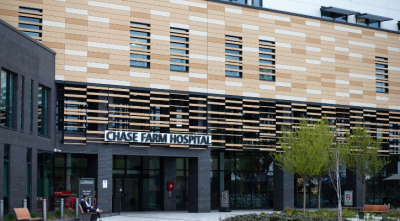Patients are referred to our breast department if they have symptoms that could be caused by breast cancer.
It is important that any cancer is diagnosed as early as possible so it can be treated effectively.
You may have been referred to the department by your GP because you noticed a possible symptom, or you may have been referred through the NHS breast screening programme.
Diagnosis
During your first appointment, you will be reviewed in the breast triple assessment clinic.
Here you will be seen by a breast surgeon, or one of the registrars, who will carry out a clinical examination of the breasts and axilla (the area under the shoulder), followed by an ultrasound and possibly a mammogram. They may also take a biopsy (a small sample of body tissue).
If breast cancer is diagnosed, you will then meet with a breast surgeon and one of our breast clinical nurse specialists to discuss the diagnosis.
You may require further tests to help us ‘stage’ the cancer. This means establishing the size, type and whether there is any spread to other parts of your body. This will allow treatment specific to your cancer to be planned.
The following tests may be used to stage the cancer:
- CT (computerised tomography) scan
- breast MRI (magnetic resonance imaging)
- FDG PET-CT scan (a combination of a positron emission tomography scan and a CT scan)
- bone scan
Treatment planning
The management of breast cancer depends on the stage of disease at diagnosis, the breast cancer receptors (hormone or protein receptors that affect how the cancer grows) and the patient’s fitness to undergo treatment.
Once diagnostic and staging tests are completed, every patient is discussed at a multidisciplinary team meeting. This is a meeting between the surgeons, oncologists, radiologist, histopathologists and clinical nurse specialists.
All results and patient history are discussed, and a course of treatment is recommended on an individual basis.
Patients do not attend this meeting, but you will have an appointment with the appropriate team member after the meeting to discuss the outcomes and plan.
Treatment options
Patients with breast cancer may be treated with surgery, chemotherapy, immunotherapy, radiotherapy or endocrine therapy.
Your treatment plan will be specific to your breast cancer and will often include a combination of some or all of these treatments.
Patients with inoperable or metastatic (where the cancer has spread to elsewhere in the body) disease will be considered for chemotherapy, immunotherapy and/or radiotherapy.
All treatment plans offered will be tailored to your cancer and your fitness to undergo treatments. They will be fully discussed with you so that you understand why the treatment is being offered.
Clinical trials
Research is essential in order to raise standards of cancer care, and to improve the prognosis of patients with breast cancer.
Not all patients are suitable for research trials or are willing to take part in one. But all patients will be given the option of taking part in a research trial if one is available.
Contact information
Breast surgery clinical nurse specialists: 020 7794 0500 ext 34650
Breast oncology clinical nurse specialists: 020 7830 2494
Stratified follow-up team (care after cancer treatment): 020 7317 7733
Chase Farm Hospital
Breast clinical nurse specialists team: 020 8375 1620
 Translate
Translate




